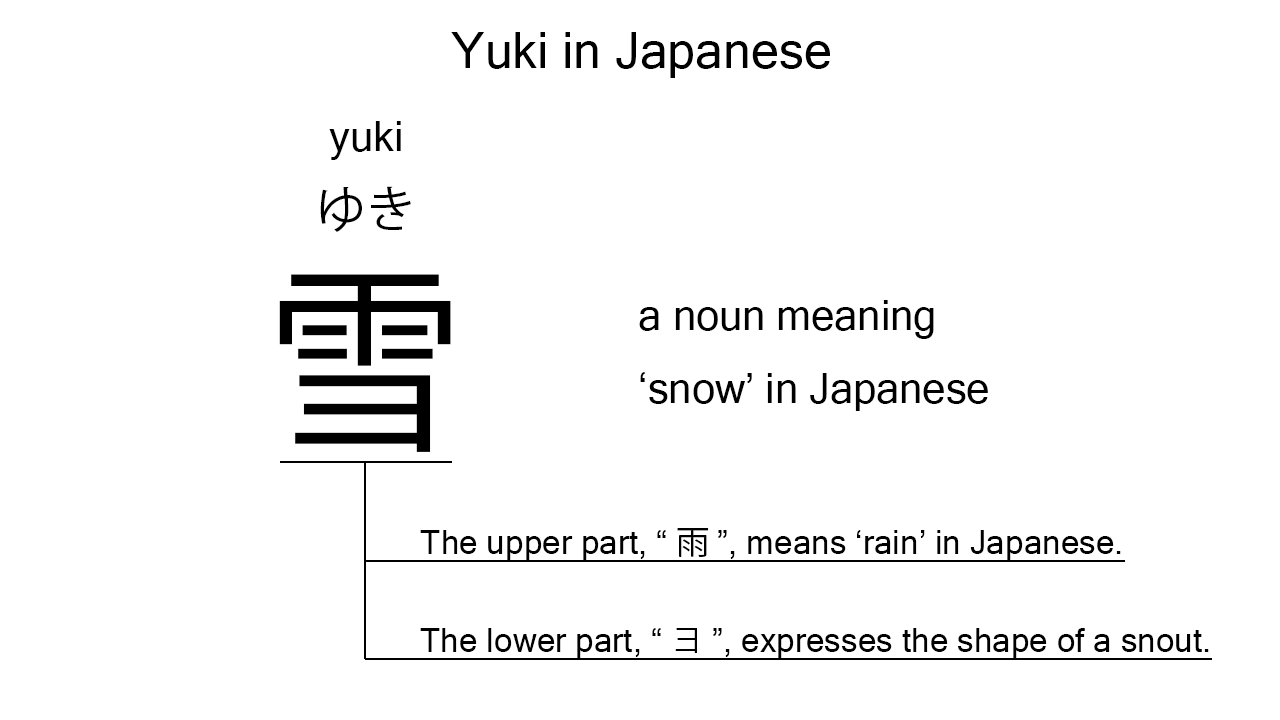What does “yuki” mean in Japanese?
There are some homophones in Japanese. When native speakers use yuki as an individual noun, however, most probably it means ‘snow’ in Japanese. Perhaps, some Japanese learners know this noun as it is sometimes used in Japanese movies, songs, novels, manga, anime, and the like. In this blog post, however, I’m explaining it in detail based on its kanji character. And also, I’m explaining how to use it through example sentences. My explanations would help Japanese learners understand yuki more clearly. Then, let’s get started!
Contents
Definition and meaning of “yuki”
Let me start with the definition and meaning of yuki.
- yuki – 雪 (ゆき) : a noun meaning ‘snow’ in Japanese.
Japanese native speakers use this noun to refer to flakes of frozen water falling from the sky or piling up on the ground. So, the usage is very similar to that of the English noun, snow, I think.
The definition and meaning are simple and clear. To understand this noun more clearly, however, let me explain its kanji character in detail.
Yuki in kanji
The kanji character of yuki consists of the following two parts:
- 雨 : a kanji character widely used to mean ‘rain’ in Japanese.
- ヨ : a kanji radical expressing the shape of a snout.
From these two parts, we can understand that yuki literally means ‘rain and snout’ in Japanese. This literal interpretation is not in line with the actual meaning. Interestingly, however, the radical for a snout looks like layers of snow. The kanji character is therefore still a good expression for snow, I think.

When we meet new kanji characters, we should check their parts in detail to understand their meanings clearly and deeply. In many cases, kanji parts tell us a lot about the meanings of the characters they form. Actually, here, we could get the better understanding of yuki through the detailed check above.
So far, I’ve explained the definition and meaning of yuki together with its kanji parts. Then, let me explain how to use it through the example sentences below.
How to say “snow” in Japanese
kyou wa yuki ga fut te iru – 今日は雪が降っている (きょうはゆきがふっている)
Snow is falling today.
Below are the new words used in the example sentence.
- kyou – 今日 (きょう) : a noun meaning ‘today’ in Japanese.
- wa – は : a binding particle working as a case marker or topic marker. In the example, this works as a topic marker after kyou to put a focus on it.
- ga – が : a case particle used to make the subject word or the object word in a sentence. In the example, this is used after yuki to make the subject in the sentence.
- fut – 降っ (ふっ) : one conjugation of the verb, furu, which means ‘to fall’ in Japanese. In the example, it has been conjugated for the better connection with its following word.
- te – て : a conjunctive particle used after a verb, adjective, or auxiliary verb to make its te form. In the example, this is used after fut to make its te form, fut te. Verbs need to be changed to their te forms to be connected with iru.
- iru – いる : an auxiliary verb used to express the continuity of the action described by its preceding verb. In the example, this is used after the te-formed verb, fut te, to express the continuity of its action, ‘to fall’.
This is a typical usage of yuki. In this example, it works as a part of the commonly-used phrase, yuki ga fut te iru, which literally means ‘snow is falling’ in Japanese. Perhaps, it should be translated into English as ‘it’s snowing’, though.
Another example of “yuki”
boku wa yuki ga suki desu – 僕は雪が好きです (ぼくはゆきがすきです)
I like snow.
Below are the new words used in the example sentence.
- boku – 僕 (ぼく) : a pronoun meaning ‘I’ in Japanese. This is used mainly by boys and young males.
- suki – 好き (すき) : the stem part of the na-adjective, sukina, which means ‘favorite’ in Japanese. Native speakers, however, often use this as an individual word to mean ‘to like’ or ‘to love’ in Japanese. In the example, actually, this is used to mean ‘to like’ in Japanese.
- desu – です : an auxiliary verb used after a noun or adjective to make it polite. Probably, this is well known as a part of Japanese desu form. In the example, this is used after suki to make it sound polite.
This is another example of yuki. In this example, it works again with the case particle, ga, but becomes the object in the sentence. Anyway, when we want to mean ‘snow’ in Japanese, this noun is always a very good option.
Summary
In this blog post, I’ve explained the definition and meaning of yuki in detail based on its kanji character. And also, I’ve explained how to use it through the example sentences. Let me summarize them as follows.
- yuki – 雪 (ゆき) : a noun meaning ‘snow’ in Japanese. Japanese native speakers use this noun to refer to flakes of frozen water falling from the sky or piling up on the ground. So, the usage is very similar to that of the English noun, snow. This kanji literally means ‘rain and snout’ in Japanese. This literal interpretation is not in line with the actual meaning. Interestingly, however, the radical for a snout looks like layers of snow. The kanji character is therefore still a good expression for snow, I think.
Hope my explanations are understandable and helpful for Japanese learners.
Leave a Reply